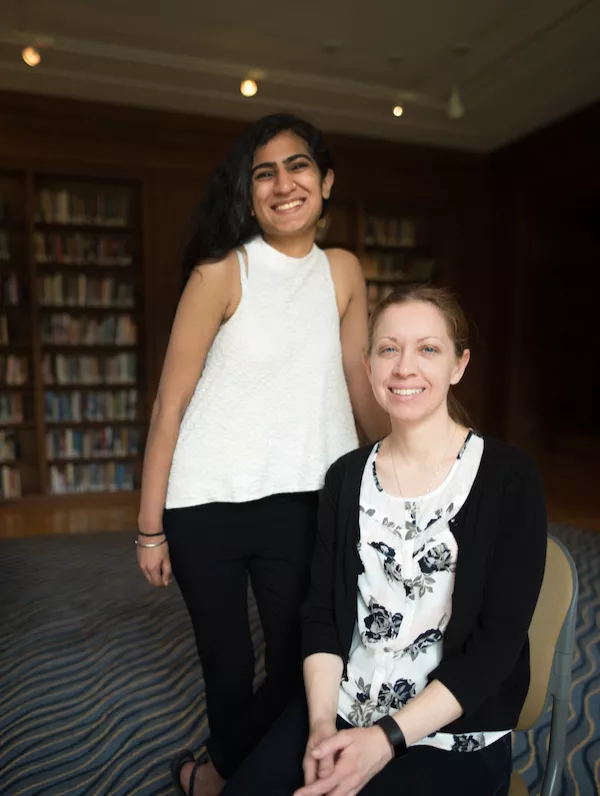Manroocha Singh ’18 Hopes to Translate Experiences from College Classrooms to K-5 Education

Manroocha Singh ’18 started at Bryn Mawr as a math major, but quickly decided to pair that with a minor in education. Looking to see the pedagogical theory she studies applied in real classrooms, Manroocha got involved with the Teaching and Learning Institute (TLI) as a student consultant.
TLI at Bryn Mawr, led by Professor Alison Cook-Sather, has become a model initiative in higher education. Through the TLI’s Students as Learners and Teachers (SaLT) program, undergraduate students like Manroocha work one-on-one with faculty members as consultants to help make classrooms inclusive and responsive.
“Education is truly my passion and TLI has given me the perspective to realistically apply the theory that I’ve learned through the education department,” says Manroocha. “TLI offers you a way to engage in dialogue with active professors and be in classrooms.”
Manroocha is paired with Professor Jane Chandlee from the Tri-College Department in Linguistics and the Haverford College Computer Science Department. Manroocha visits Professor Chandlee’s class once each week to take detailed notes on how pedagogical practices are implemented in the classroom. She shares her notes with Professor Chandlee, and meets with her weekly to discuss these observations.
“What’s unique about it is that you work with the student and establish what you want them to observe," says Professor Chandlee. "You’re not being evaluated, like other kinds of observation. You say ‘this is what I’m worried about, what do you think?’ So they can narrow in on what you’re concerned about in the course—which is just amazing! You never get that; even if you could get another faculty member to do that for you, they don’t have the student perspective, so having her there was really invaluable.”
Manroocha hopes to teach elementary students, so Professor Chandlee is very conscious about what lessons Manroocha will be able to apply to younger students. “You want to be deliberate," she says. "You want to always be thinking ‘are we making the best use of our time,’ and with that student perspective, even with younger children, how are they feeling about this experience of taking this class with you as their teacher? Hopefully observing how much I think about that, she can take that with her.”
Manroocha has written about her experience with the SaLT program in “Moving from ‘Us vs. Them’ to ‘Us’ through Working in Pedagogical Partnership,” which appears in the academic journal Teaching and Learning Together in Higher Education. Her piece explores the common divide in classrooms between teachers and students, and shares how her partnership helped her brainstorm methods for addressing classroom hierarchies.
After graduation, Manroocha will be attending the University of Pennsylvania’s Graduate School of Education, where she’s enrolled in the 10-month M.S.Ed. and Certification in the Urban Teaching Apprenticeship Program. She hopes to carry her experiences with TLI beyond graduate school, to ultimately help her address power dynamics in the classroom, and to engage and excite students from a young age.
Manroocha is excited to apply the practices she has seen to younger audiences. “Little kids are often so discredited and invalidated for the amount of thought and agency that they have at that age," she says, "especially those from marginalized backgrounds. That’s something I want to highlight and center in the classroom. I want to take that same rigorous and creative way to teach, and I want to apply it to younger students. People overlook elementary; they think elementary is basic and fundamental. But my perspective is that in K-5, students are forming their impression of school as a whole.”
In addition to the SaLT program, TLI offers faculty pedagogy seminars, open pedagogy conversations, and pedagogy workshops for graduate students.